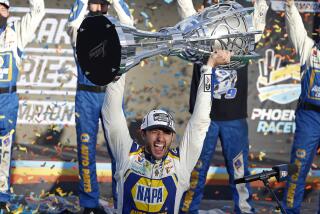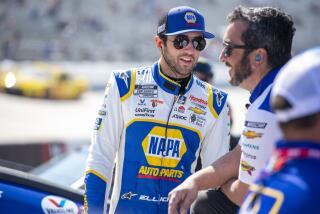Pressure Is Off Elliott, at Least for Now, as He Goes for Riverside Win
- Share via
RIVERSIDE — If a casting director set out across America to find a perfect Huckleberry Finn, his search could end in Dawsonville, Ga.
That’s the residence of Bill Elliott--lanky, gangling, freckle-faced, tousled hair the color of red Georgia clay and a Dixie drawl as thick as squirrel stew.
Bill and his wife, Martha, and his daughter, Starr, 7, don’t live on a river raft, as Huck did. But they do still live in the basement of his grandmother’s house, even though the 29-year-old breadwinner has earned more than $2 million in the last four years driving a fast Ford race car.
“Ain’t no use moving,” he says. “I’m across the street working in the shop most of the day, and nights, too. Martha works there, too, and Starr’s home with Grandma. What’d be the sense in moving?”
Dawsonville, population 600, is more Elliotts than anybody. Bill’s older brother, Ernie, builds the engines. Dan, another brother, works in the shop. Their dad, George, ran a family race team until he sold it in late 1981 to Harry Melling, a tool manufacturer from Jackson, Mich. George still oversees the operation.
Elliott has already pocketed $514,000 this year by winning five of 11 NASCAR Winston Cup races. Today, he will try for No. 6 in the $225,000 Budweiser 400, a 400-kilometer (249 miles) race on Riverside International Raceway’s 2.62-mile road course.
Winning races has not been Elliott’s biggest problem this year. Worse, for a backwoods country boy from northern Georgia, has been the press of the nation’s media.
Last Sunday in Charlotte, N.C., had Elliott won the World 600, he would have won a $1 million bonus from a tobacco company for winning three of NASCAR’s four biggest races--the Daytona 500, Winston 500, World 600 and Southern 500. He won Daytona and the Winston at Talladega by overpowering margins and was a popular favorite to pocket the bonus money.
Elliott finished 18th, 21 laps behind winner Darrell Waltrip, after fighting a faulty radio, tire problems and brake line failure. Other than two early season races in which he crashed, it was the redhead’s worst finish in 1985 and he feels the disruptive atmosphere and hoopla surrounding the million-dollar bonus was a major factor.
“Everyone knows I do all the work in the shop setting up the chassis and taking care of everything except the engine,” Elliott said. “All the demands on my time took away from our team effort. I never had an opportunity to complete the chassis work needed for Charlotte. I was never so happy as I was Monday when it was all over and I helped get the car in the truck and didn’t have a worry in the world except coming on out here to Riverside.”
The pressure started after Elliott won May 5 at Talladega and the $1 million became a possibility.
“There were lots of writers and TV crews coming to the shop in Dawsonville the next week,” he said. “I almost lost one whole week. On Monday Kyle (Petty) and I did a Ford commercial. Tuesday and Wednesday the shop was full of media--USA Today, the New York Times, People magazine, I don’t know how many others. Thursday I was in New York for a press conference for the Winston people. Friday, Saturday and Sunday I was at the track at Dover (Del.) for that race. Now that didn’t leave a lot of time to work on the car. I’d never been in a position like that. Everything seemed so disorganized to me that it got almost too hard to bear. I’ll admit, I didn’t know how to handle it.”
Elliott has another chance at the $1 million in the Southern 500 Sept. 1 at Darlington, S.C.
“I’ll be better able to handle it next time,” he said. “As far as the money is concerned, it don’t mean that much. It’s not like the money is in our hands, and someone is going to take it away if we don’t win.”
Another vexing problem, from Elliott’s viewpoint, is what he perceives as an attempt by NASCAR to blunt the hard work of his family and make the General Motors cars more competitive by legislation. After the Daytona win, a rule change was made requiring cars to be the same height even though Fords had a 50-inch roof line and GM cars a 51-inch line in factory models.
When that apparently failed to slow Elliott’s Ford, NASCAR announced a new carburetor-restriction rule that is designed to reduce speeds five to six m.p.h. Although the GM drivers say it’s an “across the board” rule, Elliott claims it will hurt his car more because the Chevrolets are not as stable as his Ford at speeds over 202 m.p.h.
Seven-time NASCAR champion Richard Petty said he thought the rules were changed because the Elliotts flaunted their car’s superiority.
“If I’d had the edge Bill Elliott had at the beginning of the season,” Petty said, “you’d never have known it. I might have won all the same races he’s won, but I’d have never shown the strength he’s shown.”
Elliott, who has won nine races to Petty’s 200, said: “I haven’t won enough races to know when you can take it easy,” Elliott said. “We worked hard to get where we are, and it’s not our way to not run as hard as we can.”
Elliott won his first NASCAR race at Riverside in the Winston Western 500 in November, 1983. If he wins today it will be the first time he has won two races on the same NASCAR track.
However in Friday’s qualifying, with parts of the track slick with oil dumped by Glen Francis’ car when his oil line broke, Elliott could squeeze only a lap of 113.886 from his Ford. This put him in the sixth row for today’s 1 p.m. race.
More to Read
Go beyond the scoreboard
Get the latest on L.A.'s teams in the daily Sports Report newsletter.
You may occasionally receive promotional content from the Los Angeles Times.










